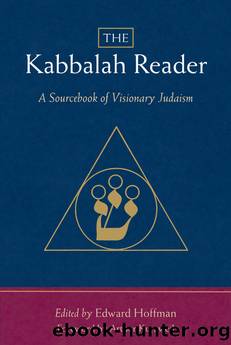The Kabbalah Reader by Edward Hoffman

Author:Edward Hoffman
Language: eng
Format: epub
Publisher: Shambhala
PART FOUR
Industrial Age Thinkers
ca. Eighteenth and Nineteenth Century
23
THE GAON OF VILNA
Elijah ben Solomon
IN POPULAR ACCOUNTS today of Jewish history, Rabbi Elijah ben Solomon is typically cast as the archenemy of Hasidism, who fiercelyâand ultimately unsuccessfullyâbattled its leadership in late-eighteenth-century Eastern Europe. Such is indeed true. But not at all accurate is the related description of the Vilna Gaon (Genius of Vilna as he was admiringly known) as a ârationalistâ hostile to the Kabbalah so beloved among ardent Hasidic followers.
For not only was Rabbi Elijah ben Solomon a prolific writer on Kabbalistic works including the Sefer Yetzirah (Book of Creation) and especially the Zohar, but he also engaged in transcendental practices from an early age. Tradition has it that before his bar mitzvah, he tried to create a golem by consulting the Sefer Yetzirahâbut then decided not to. According to legend, the Vilna Gaon regularly experienced maggidic visitations in his reclusive way of life, but preferred to solve Torah mysteries on his own rather than receive âspoon-fedâ revelations from his celestial messenger. Though Rabbi Elijah ben Solomon never held an official position in any synagogue, yeshiva, or communal institution, he exerted tremendous Jewish influence as a scholar and legal thinker unparalleled in his era; among his most important disciples was Rabbi Chaim of Volozhin, founder of what came to be a highly influential yeshiva for nearly a century.
This excerpt is from the Vilna Gaonâs intriguing commentary on the biblical book of Jonah. Stylistically far more accessible than many of his other Kabbalistic writings, it remains well known among Judaic readers today. Undoubtedly, its erudite author was inspired by the Zoharâs classic dictum that the Jonah narrative is symbolic of each human soulâs sojourn through myriad worlds.
In addition to its literal meaning, the story of Jonah can be understood on a deeper level as an analogy to the sojourn of the neshamah (human soul) in this world. Jonah the Prophet represents manâs neshamah.
God sent Jonah to rectify the moral condition of Nineveh, but instead of fulfilling Godâs will, Jonah tried to escape his obligation by boarding a ship bound for a different destination. Similarly, the neshamah is sent to rectify the world through Torah study and mitzvot, but instead of fulfilling its mission, it allows itself to be deceived by the bodyâs physical impulses. The bodyâs ability to deceive the neshamah in this manner is alluded by the name Jonahâin Hebrew, the word yoneh is a verbal form related to the noun hunaheh, deception. This etymological link forms the basis of the correlation between Jonah the Prophet and the neshamah. The analogy has many facets.
Just as Jonah initially failed to carry out his mission and consequently endangered his life, so too, the neshamah initially fails in its mission to rectify the world and consequently brings great harm upon itself in the process. And although Jonah was granted a second chance to complete his mission, he was very distressed by what he perceived as his bad fortune. The same is true of the
Download
This site does not store any files on its server. We only index and link to content provided by other sites. Please contact the content providers to delete copyright contents if any and email us, we'll remove relevant links or contents immediately.
| Hebrew Bible (Old Testament) | Talmud |
| Torah | Zohar |
The Power of Habit by Charles Duhigg(3119)
Man's Search for Meaning by Viktor E. Frankl(2664)
Mckeown, Greg - Essentialism: The Disciplined Pursuit of Less by Mckeown Greg(2414)
MOSES THE EGYPTIAN by Jan Assmann(2411)
Devil, The by Almond Philip C(2323)
The Complete Dead Sea Scrolls in English (7th Edition) (Penguin Classics) by Geza Vermes(2269)
Unbound by Arlene Stein(2267)
I Capture the Castle by Dodie Smith(2032)
Schindler's Ark by Thomas Keneally(1874)
The Invisible Wall by Harry Bernstein(1799)
The Gnostic Gospel of St. Thomas by Tau Malachi(1781)
The Bible Doesn't Say That by Dr. Joel M. Hoffman(1675)
The Secret Doctrine of the Kabbalah by Leonora Leet(1600)
Political Theology by Carl Schmitt(1569)
The Jewish State by Theodor Herzl(1527)
A History of the Jews by Max I. Dimont(1520)
The Dead Sea Scrolls Bible by Martin G. Abegg(1501)
The Book of Separation by Tova Mirvis(1480)
Oy!: The Ultimate Book of Jewish Jokes by David Minkoff(1360)
